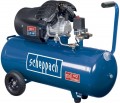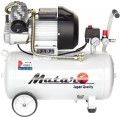Input performance
The amount of air that the compressor is able to process per unit of time; usually stated in liters per minute. Performance, along with pressure (see below), is one of the most important parameters: it is it that primarily determines how compatible the compressor will be with one or another pneumatic tool.
It is worth choosing a model according to this indicator in such a way that it can be guaranteed to “pull out” all the tools that can be connected at the same time. Air consumption is usually directly indicated in the characteristics of each tool, and it is quite simple to calculate the total requirement. However, due to the design features, the compressor must have a certain performance margin; the specific value of this stock depends on a number of nuances.
The main point is that some companies indicate for their units the performance at the outlet (how much air is supplied to the tool), while others indicate at the inlet (how much air the compressor sucks in). Since no compressor is perfect, part of the air is inevitably lost during the compression process, so the amount of air at the outlet will always be less than at the inlet. Accordingly, if the output performance is indicated in the characteristics, a margin of 10-20% is recommended, and if the input is 35-40%.
There are also more complex techniques that allow you to more accurately derive the required performance depending on the characteristics of specific tools; they can be found in...special sources.
Rated pressure
The maximum pressure created by the compressor during operation. This parameter, as well as the performance described above, is very important for selecting a compressor for a specific pneumatic tool: it is necessary that the nominal pressure be not lower than the working pressure of the tool. At the same time, high pressure is not a problem — it can be reduced by the appropriate regulator on the gearbox.
Most modern compressors have a
pressure rating of 8 bar, which is sufficient for most air tools. Units for 6 bar belong to the entry level, their main purpose is painting work, where high pressure is not required. There are also options for 10 bar and even more — they, usually, belong to specialized models and cost accordingly. Therefore, it is worth looking specifically for a high-pressure unit only if this parameter is critical for the planned work (for example, if you need a compressor for tyre fitting).
When selecting according to the nominal pressure, it must be taken into account that the maximum allowable pressure in the receiver is usually indicated as the nominal pressure. The pressure actually given out by the compressor to the outlet is often somewhat less, this is due to some design features. For the most popular nominal pressure options — 8 and 10 bar — the real figures are usually 2 bar less, i.e. 6 and 8 bar respectively.
Receiver volume
The receiver is a tank (cylinder) into which compressed air is pumped during operation of the compressor; it is from this cylinder (and not directly from the working mechanism) that it is fed to the connected instrument. The main meaning of such a scheme is that the receiver compensates for pressure unevenness that occurs during the operation of the main mechanism; it does not guarantee absolute constancy, however, all changes occur very smoothly. In addition, energy savings are ensured in this way: part of the time the compressor runs on the stored air from the receiver, and the engine turns on only when the pressure in the tank is significantly reduced to replenish supplies. Therefore, this piece of equipment is practically mandatory, models
without a receiver are extremely rare today.
In general, the larger the volume of the receiver, the less often it will have to be pumped up after the initial filling with compressed air. It is also believed that a volumetric receiver can partly compensate for the lack of compressor performance; however, this moment does not ensure the constant stable operation of the “gluttonous” tool and serves only as a fallback in case of a short-term increase in air consumption. On the other hand, large volumes mean the corresponding dimensions of the tank (and it is already the largest part in most compressors), and the cost of the device increases accordingly. Therefore, when choosing, it is worth observi
...ng a certain balance and choosing a receiver depending on the specifics of the work. For various types of activities there are recommendations, they can be found in special sources. Here we note that for relatively uniform work in time with a small air flow, a small receiver is usually enough, and if peak loads can occur frequently, it is better to choose a larger cylinder.
Some compressors may provide the expansion of the receiver with additional tanks.Noise level
The maximum noise level produced by the compressor during operation. When evaluating it, it must be taken into account that the decibel used to evaluate noise is not an absolute value. In fact, this means that noises, for example, 20 dB and 40 dB differ in level not by a factor of 2, but by 100 — it is this multiplicity that corresponds to a difference of 20 dB; a twofold increase corresponds to a 3 dB increase. Therefore, to assess noise levels, it is worth referring primarily to comparative tables. For values found in modern compressors, this table would look something like this:
70 dB — loud conversations at a distance of about 1 m;
75 dB — scream;
80 dB — motorcycle engine with silencer;
85 dB — loud scream;
90 dB — freight train car at a distance of 5-7 m;
95 dB — noise inside the subway car.
Anyway, the lower the level of noise produced by the unit, the more comfortable its use, the less it will “hit on the ears” and increase the volume of the entire set of working instruments.

